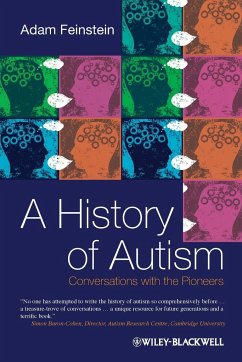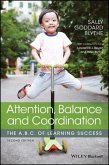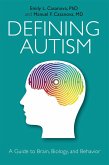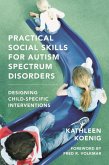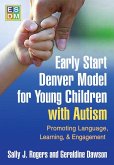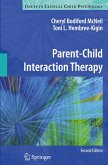This unique book is the first to fully explore the history of autism - from the first descriptions of autistic-type behaviour to the present day.
Features in-depth discussions with leading professionals and pioneers to provide an unprecedented insight into the historical changes in the perception of autism and approaches to it
Presents carefully chosen case studies and the latest findings in the field
Includes evidence from many previously unpublished documents and illustrations
Interviews with parents of autistic children acknowledge the important contribution they have made to a more profound understanding of this enigmatic condition
Hinweis: Dieser Artikel kann nur an eine deutsche Lieferadresse ausgeliefert werden.
Features in-depth discussions with leading professionals and pioneers to provide an unprecedented insight into the historical changes in the perception of autism and approaches to it
Presents carefully chosen case studies and the latest findings in the field
Includes evidence from many previously unpublished documents and illustrations
Interviews with parents of autistic children acknowledge the important contribution they have made to a more profound understanding of this enigmatic condition
Hinweis: Dieser Artikel kann nur an eine deutsche Lieferadresse ausgeliefert werden.
"'No one has attempted to write the history of autism so comprehensively before. Adam Feinstein's highly readable but remarkably thorough book contains a treasure-trove of conversations with the scientists, clinicians, lobbyists, and parents who have shaped the development of autism in both research and policy. The timing of this book is opportune, as the pioneer generation become 'emeritus'. History-telling is never wholly objective, but Feinstein (the science-writer, parent, and international conference organizer) is better placed than almost anyone to document the extraordinary changes that have happened to the autism community world-wide since the 1940s onwards. This book is an important contribution to the history of medicine and a unique resource for future generations who will build on their predecessors." -- Professor Simon Baron-Cohen, Director, Autism Research Centre, Cambridge University
"Another fascinating book on autism. I highly recommend it to anyone interested in the subject: those that have a person with autism in their family, professionals and academics, and anyone in general. . . In my opinion, Feinstein has made a significant effort to be impartial, something that I am sure it has not been easy." (Iautism, 2011)
"Recommended. Graduate students, researchers, professionals." (Choice , 1 April 2011)
"Feinstein offers one of the first truly comprehensive overviews of the history of autism research...culminating with a discussion of the projected future of autism research. He interviewed dozens of researchers and prominent autistic people in several countries, in addition to consulting numerous primary sources to compile this authoritative text. Feinstein traces the condition from before it was known as autism through the present day, and in so doing, methodically dissects both the parental blame hysteria that gripped the 1980s and the explosion of autism awareness and controversy in the twenty-first century." (Asperger's Association of New England Journal, Fall/Winter 2010)"This is a much needed book on the history of autism. What sets this book apart from the others is the description of the hypotheses about the disorder back when Dr. Kanner and Dr. Asperger were first writing about their unique discoveries. It provides readers with a much needed understanding of the disorder from the past as well as the present." (Doody's, September 2010)
"This book is more than a collection of facts; it's also a detailed account of often-fierce controversy and professional rivalry....... Feinstein's book is a fascinating and indispensable record of the journey so far." (Special Children, 2010)
"In his History of Autism, Adam Feinstein has documented in an entertaining and yet exacting way, the evolving history of how our present-day ideas about autism reflect the personalities and interests of key individuals, who played critical roles in our understanding of this perplexing symptom complex. He has been to interview them, all over the world, and draws some fascinating responses to his questions. It is particularly pleasing that he managed to gather the material for his review before the most elderly among the pioneers passed away, as several have done within the past 2 or 3 years." (Brain: A Journal of Neurology, 2011)
"Recommended. Graduate students, researchers, professionals." (Choice , 1 April 2011)
"Feinstein offers one of the first truly comprehensive overviews of the history of autism research...culminating with a discussion of the projected future of autism research. He interviewed dozens of researchers and prominent autistic people in several countries, in addition to consulting numerous primary sources to compile this authoritative text. Feinstein traces the condition from before it was known as autism through the present day, and in so doing, methodically dissects both the parental blame hysteria that gripped the 1980s and the explosion of autism awareness and controversy in the twenty-first century." (Asperger's Association of New England Journal, Fall/Winter 2010)"This is a much needed book on the history of autism. What sets this book apart from the others is the description of the hypotheses about the disorder back when Dr. Kanner and Dr. Asperger were first writing about their unique discoveries. It provides readers with a much needed understanding of the disorder from the past as well as the present." (Doody's, September 2010)
"This book is more than a collection of facts; it's also a detailed account of often-fierce controversy and professional rivalry....... Feinstein's book is a fascinating and indispensable record of the journey so far." (Special Children, 2010)
"In his History of Autism, Adam Feinstein has documented in an entertaining and yet exacting way, the evolving history of how our present-day ideas about autism reflect the personalities and interests of key individuals, who played critical roles in our understanding of this perplexing symptom complex. He has been to interview them, all over the world, and draws some fascinating responses to his questions. It is particularly pleasing that he managed to gather the material for his review before the most elderly among the pioneers passed away, as several have done within the past 2 or 3 years." (Brain: A Journal of Neurology, 2011)

